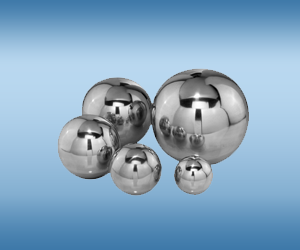
Precision balls are widely used to permanently plug up holes in manufactured parts where holes have to be drilled in the workpiece to create flow channels. The ball can be from a variety of materials which are referenced below. The ball is press fit in the hole such that it creates a permanent seal. Typically the balls are Grade 50 or better as the consistency of the diameter and roundness are important to yield a good seal.
Some customers prefer a fully hardened ball to be press fit into a softer more ductile casting. Other customers prefer the ductility of an aluminum ball so that most of the deformation occurs within the ball. Precision aluminum balls lend themselves to use in automated machinery for easy installation. An oversize ball can be press fit into an undersized hole to produce a good seal, but this requires a reasonably precision hole and the hardness of the ball should not be over 35 HRC. Conversely, when a hardened steel ball is used to plug the hole, all the deformation takes place within the workpiece drilled hole. Interference sizing between the ball and the hole is critical such that the casting is not cracked during the press fit operation.
Plug Ball Materials:
- Fully hardened chrome steel balls
- Stainless steel (302-316, 416-440)
- Aluminum 2017-T4
- Brass
- Low carbon steel






